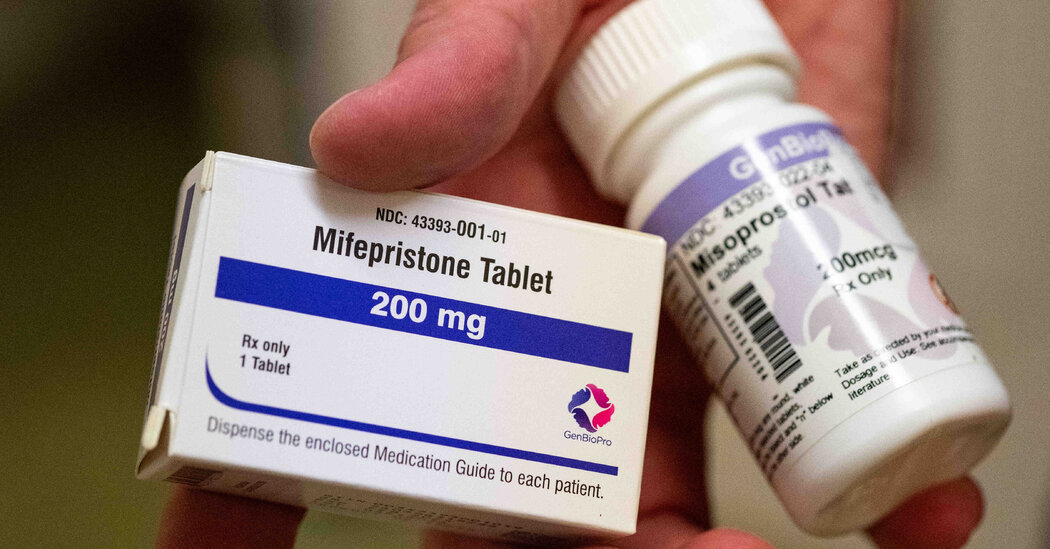The future of abortion — both the practice itself and the legal fight over it — will increasingly revolve around prescription drugs.
That’s been evident for a while, and the dueling legal decisions last week about a commonly used abortion drug made it even clearer. In the end, the Supreme Court may need to resolve the dispute and decide whether the drug can continue to be used.
With help from Times reporters who are covering the story, today’s newsletter will explain why medication abortion, as the practice is known, is growing so rapidly and what’s likely to happen next.
‘Existential crisis’
Medication abortion has become more common over the past decade and now accounts for more than half of legal abortions. Typically in the U.S., the treatment involves a combination of two drugs, mifepristone and misoprostol.
The treatment has become more popular partly because many women prefer it to surgical abortion. They can take the drugs at home rather than at a hospital or doctor’s office, and the drugs are both highly effective and safe. Emergency rooms see more people suffering side effects from Tylenol, Christina Jewett, who covers the F.D.A. for The Times, pointed out.
“This drug has been studied and scrutinized heavily for more than 20 years,” Christina told me. (This graphical review of the evidence is illuminating.)
Since the Supreme Court overruled Roe v. Wade last year, 13 states have banned nearly all abortions, including medication abortions. But some women in those states have been able to get around the bans with a drug prescription. They can briefly travel to another state to receive the pills or can order them by mail (even illegally from an overseas provider, as some abortion-rights advocates have encouraged).
The rise of medication abortion explains why overall abortion rates have not declined as much post-Roe as some people expected. Nationwide, the number of legal abortions per month was 7 percent lower in the final three months of last year than in the months immediately before the Supreme Court ruling, according to a report issued yesterday by the Society of Family Planning. Because the data does not include illegal abortions, the actual decline was likely smaller, my colleague Margot Sanger-Katz said.
Both abortion supporters and opponents understand how important medication abortion has become. “The fact that pills can be mailed is an existential crisis for the anti-abortion movement,” Rachel Rebouché, the dean of Temple University’s law school, told The Associated Press. “It’s hard to police. It’s hard to track. It’s difficult to enforce.”
The rulings
Conservative judges have become bolder in recent years about trying to strike down laws they do not like, and Friday’s ruling against mifepristone was part of the trend. In it, Judge Matthew Kacsmaryk, a Donald Trump appointee in Texas, held that the F.D.A. had erred when it approved the drug in 2000.
Some of Kacsmaryk’s reasoning seemed plausible on its face: He noted that the agency used a process intended for serious illnesses and argued that pregnancy was not an illness. Other parts of his ruling seemed at odds with reality: He claimed the drug was unsafe. Either way, it was a radical ruling. No court had previously overridden an F.D.A. approval of any drug.
For that reason, even some conservatives criticized the decision. My colleague Adam Liptak wrote that the legal scholars he interviewed described Kacsmaryk’s decision as being of “poor quality” and “breathtaking sweep.”
Jonathan Adler, a conservative law professor, and The Wall Street Journal’s editorial board also criticized the ruling. More than 400 pharmaceutical executives and investors condemned it as being “without regard for science or evidence” and dangerous to many future drug treatments.
On the same day as Kacsmaryk’s decision, Thomas Rice — a federal judge in Washington State appointed by Barack Obama — issued an opposing ruling in a different case. Rice granted a request from the Democratic attorneys general of 17 states and Washington, D.C., that the F.D.A. not limit access to mifepristone in their jurisdictions. Rice’s ruling could effectively void Kacsmaryk’s ruling in those 18 states.
Kacsmaryk placed a one-week delay on the implementation of his decision, to give an appeals court, based in New Orleans, time to review it. The outcome of the appeal may depend on whether the three judges randomly assigned to it happen to be conservative or liberal, but the New Orleans court isn’t likely to have the final word. The Supreme Court is.
What’s next
Many legal experts say they aren’t sure to what to expect. If the appeals court overturns Kacsmaryk’s decision, the case could simply end, at least for now. Or the Supreme Court could agree to hear the case and rule that the status quo remains in effect until it rules. In that situation, mifepristone would still be widely available in much of the country but not in the 13 states that virtually ban abortion.
If Kacsmaryk’s ruling stands, the F.D.A. and the rest of the Biden administration would have to decide whether they wanted to defy it, using Rice’s ruling as justification. Alternately, doctors could decide to offer medication abortion using only misoprostol, as is common in Europe. The misoprostol-only approach is also safe and effective, although side effects, such as painful cramps, can be worse. (Here’s an explainer from Pam Belluck.)
Abortion opponents understandably celebrated when the Supreme Court overruled Roe. But even in the new legal landscape, preventing abortion is more difficult than it was in 1973, when the court issued the Roe ruling. The U.S. courts have since made abortion less accessible, but scientific developments — namely the rise of abortion drugs — have pushed in the other direction.
For more
THE LATEST NEWS
Politics
Pentagon Documents Leak
-
The documents appeared on a small social media community devoted to wow_mao, a YouTube figure who said he was an “internet micro-celebrity, and I’d like to keep it that way.”
-
Opposition lawmakers in South Korea criticized the documents as evidence of U.S. spying. President Yoon Suk Yeol sought to downplay the disclosures.
International
Other Big Stories
Opinions
“The people of Tennessee and the nation witnessed a travesty against democracy last week,” writes Justin Pearson, who was expelled from the Tennessee State Assembly by Republican lawmakers.
What happened to America? Times Opinion spoke with people in their 70s and 80s about the state of the country.
Rolling supercomputers
Car designs are prompting a new question: How much screen is too much screen?
Screens have become integral to modern vehicles, combining traditional functions like audio displays with optional content like social media feeds. All those services can distract drivers, as can the screens’ increasing sizes and clunky interfaces.
“Screens have their right of existence — they do a lot of things better than physical switches,” Klaus Busse, Maserati’s head of design, told The Times. “It’s just been pushed a little too far.”
















Leave a Reply